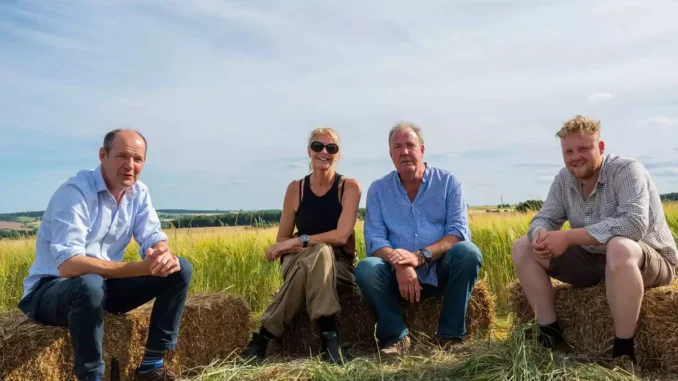
Diddly Squat Farm has fallen victim to the ‘wettest summer yet’ as the star of Clarkson’s Farm shares an update with viewers.
Jeremy Clarkson has sparked concern for Diddly Squat Farm’s future after sharing an aerial picture from above his 1,000 acre land with a worrying caption.
The star of Clarkson’s Farm wrote alongside the picture, which he shared on his Instagram page, that it was going to be a “rough year” for the farm, adding: “All that seed sowed, drowned with the constant rain.”
This comes after much of the UK experienced an onslaught of rain over May and June, with peopler branding it the “wettest summer yet” – news which has not been met well by the farming community as they struggle to survive in the current climate.
Jeremy is currently filming the fourth series of Clarkson’s Farm, an Amazon Prime Video documentary series which follows the former Top Gear star as he attempts to make Diddly Squat Farm a success, alongside the help of his girlfriend Lisa Hogan, Farm Manager Kaleb Cooper and Land Agent Charles Ireland.
The Grand Tour star has been keeping fans of the series updated on the latest from the farm, but this latest update has only concerned viewers.
One person, who appears to share the feelings of Jeremy, commented on the post: “Another year of nonprofit farming. This is probably the biggest thing that Diddly Squat has communicated to the public over the seasons, farming _doesn’t_ make money.”
As well as entertaining the millions of viewers, Clarkson’s Farm also highlights the daily struggles of farmers across the UK as they battle with unpredictable weather and rising costs.
During series three, Jeremy and Kaleb had a competition to find out who could make the most money; Jeremy on the “unfarmed” land and Kaleb on the crops. The results found that they had a combined profit of £72,601; Jeremy made £27,614, while Kaleb made £44,987.
While the competition made for some hilarious viewing, the final scenes where they calculate their annual profits also highlighted a big issue within the farming community, with Charlie telling them that all their profits would have to be invested in the next year of farming.
“As you know farms always demand cash and we’ve started next year’s cycle,” Charlies told Kaleb and Jeremy: “So I need all of that to fund the seed, fertiliser and the sprays. Every single penny. The seed, ferts and sprays. That’s not even covering the contracting charge.”
Reflecting on this, Jeremy said: “I’ll tell you something else as well. If I hadn’t farmed the unfarmed, we’d be in trouble. The other thing as well is that, again, I’m in the fortunate position of having other income streams, but if you’re a normal farmer and this is your full-time and only job, you get two years where you don’t make any money, you’re screwed. Because of the fluctuations we saw in the price of wheat and the price of fertiliser, you don’t know where you are.
“You can’t plan. A butterfly can flap its wings in China and you go bankrupt. You used to have a relatively stable income in terms of subsidies but they’re going.”
He later added: “It meant we’d gone through a lot to earn nothing at all.”

